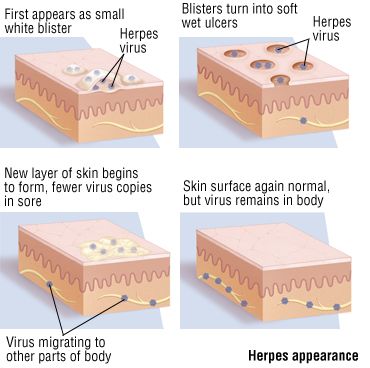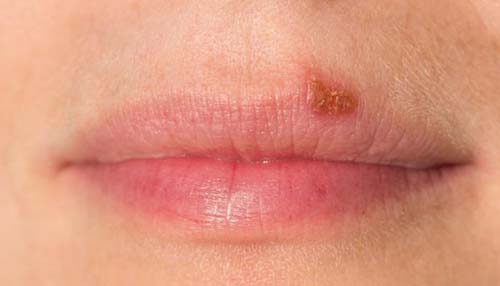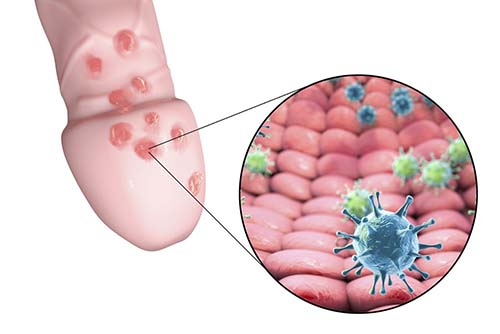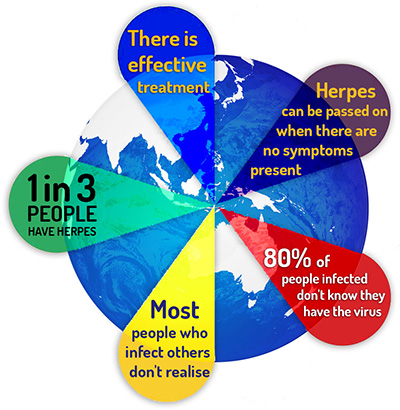What is herpes
There are two types herpes simplex virus type 1 (HSV-1) and herpes simplex virus type 2 (HSV-2). Generally speaking, HSV-1 causes cold sores (oral herpes) on the mouth, and HSV-2 causes genital herpes (which is essentially just having cold sores in your genital area, rather than your face).
It's possible to get HSV-1 genitally and/or HSV-2 orally, but not as likely as the other way around. While HSV-1 and HSV-2 aren't super picky, they do tend to prefer their former positions.

What is oral herpes?
Oral herpes is usually caused by HSV-1 and can result in cold sores or fever blisters on or around the mouth. However, most people do not have any symptoms. Most people with oral herpes were infected during childhood or young adulthood from non-sexual contact with saliva.

The HSV-I virus has potential to cause blisters on lips as well as inside mouth of patients. Studies reveal that, blisters are not limited to mouth or lips of the person but at the same time they can develop on face and tongue of the patient. This problem is well known as Oral herpes and it often affects skin surfaces.
Related: stages of a cold sore and what does a herpe sore look like.
HSV2- Genital Herpes

Such type of virus symptom leads to sores in several secret parts of human body; you may often find its symptoms at buttock, near vagina, on anus or on penis. Females usually face sores in vagina when they are suffering with Genital Herpes. Same as Oral Herpes, this type of sores can appear over any part of your skin.
Related: stages of genital herpes and what does a herpe sore look like.
Is there a link between genital herpes and oral herpes?
More than one in six Americans has genital herpes. And oral herpes is even more common. More than 50% percent of Americans have oral herpes, although people seem to care less about this. Oral herpes is "just cold sores," and yet genital herpes is "social suicide." But the truth is, they are almost identical viruses.
Oral herpes caused by HSV-1 can be spread from the mouth to the genitals through oral sex. This is why some cases of genital herpes are caused by HSV-1.
How common is genital herpes?
HSV doesn't check resumes—it's a virus. As far as it's concerned, any human with a pulse is sufficient. Literally, the only way to be 100% sure you don't get it is complete abstinence from sexual activity.
Because most people are not okay with completely abstaining from sex, most people are at risk for contracting HSV—this is fact. While condoms lessen the risk of transmission, they do not offer full protection from the virus as it can spread from mere skin-to-skin contact.
Genital herpes is common in the United States. More than one out of every six people aged 14 to 49 years have genital herpes. Read more how common is herpes. Millions of people have contracted and continue to contract HSV while having protected sex.
Have herpes and feel alone? Meet nearby people with herpes

PositiveSingles is one of the most popular dating websites for people suffering from herpes and other STD. It was initiated in 2001. With 1,510,800+ members you are sure to find lots of potentail people around you.
Join and meet nearby people with herpes, browse profiles and chat now!
Can herpes be cured?
There is no cure for herpes. However, there are medicines that can prevent or shorten outbreaks. One of these anti-herpes medicines can be taken daily, and makes it less likely that you will pass the infection on to your sex partner(s).
How do I know if I have genital herpes?
Most people who have genital herpes have no symptoms, or have very mild symptoms. You may not notice mild symptoms or you may mistake them for another skin condition, such as a pimple or ingrown hair. Because of this, most people who have herpes do not know it.
Herpes sores usually appear as one or more blisters on or around the genitals, rectum or mouth. The blisters break and leave painful sores that may take a week or more to heal. These symptoms are sometimes called "having an outbreak." The first time someone has an outbreak they may also have flu-like symptoms such as fever, body aches, or swollen glands.
Do not deal with herpes alone? Meet nearby people with herpes

PositiveSingles is one of the most popular dating websites for people suffering from herpes and other STD. It was initiated in 2001. With 1,510,800+ members you are sure to find lots of potentail people around you.
Join and meet nearby people with herpes, browse and chat now!
Likelihood of recurrence
People who experience an initial outbreak of herpes can have repeated outbreaks, especially if they are infected with HSV-2. Repeat outbreaks are usually shorter and less severe than the first outbreak. Although the infection stays in the body for the rest of your life, the number of outbreaks may decrease over time.
Genital herpes recurs frequently in many patients, especially in those with HSV type 2. Over time, recurrences generally become less frequent and less severe. However, it is also possible to have a recurrence a few years after the initial HSV infection was acquired. This type of delayed herpes outbreak can be especially distressing if you never had symptoms during the initial infection, leading you to worry about the sexual activities of your past or present sexual partner(s).
Can I still have sex if I have herpes?
If you have herpes, you should talk to your sex partner(s) and let him or her know that you do and the risk involved. Using condoms may help lower this risk but it will not get rid of the risk completely. Having sores or other symptoms of herpes can increase your risk of spreading the disease. Even if you do not have any symptoms, you can still infect your sex partners.
You may have concerns about how genital herpes will impact your overall health, sex life, and relationships. It is best for you to talk to a health care provider about those concerns, but it also is important to recognize that while herpes is not curable, it can be managed with medication. Daily suppressive therapy (i.e., daily use of antiviral medication) for herpes can also lower your risk of spreading genital herpes to your sex partner. Be sure to discuss treatment options with your healthcare provider. Since a genital herpes diagnosis may affect how you will feel about current or future sexual relationships, it is important to understand how to talk to sexual partners about herpes.
Worry about herpes transmission? Meet nearby people with herpes

PositiveSingles is one of the most popular dating websites for people suffering from herpes and other STD. It was initiated in 2001. With 1,510,800+ members you are sure to find lots of potentail people around you.
Join and meet nearby people with herpes, browse and chat now!
Prodrome
As many as 50 percent of people with a recurrent outbreak experience mild symptoms before ulcers develop. These are called prodromal symptoms, and may include itching, tingling, or pain in the buttocks, legs, or hips. Recurrences tend to become less frequent and less severe after the first year.
Triggers for recurrence
Illness, stress, sunlight, and fatigue can trigger recurrent herpes outbreaks. In women, menstrual periods may trigger an outbreak. Related:What causes herpes flare ups?
GENITAL HERPES DIAGNOSIS
The diagnosis of genital herpes is based on an individual's medical history, their signs and symptoms, and the results of tests. It is important to distinguish genital herpes from other sexually transmitted diseases, particularly those that also produce genital ulcers, such as syphilis and chancroid.
Several diagnostic tests may also be used to diagnose genital herpes. These tests can usually confirm infection and identify which virus (HSV-1 or HSV-2) is responsible. The choice of testing will depend on your symptoms and whether you have any blisters or ulcers at the time you see your doctor.
Related: how can I get tested for herpes.
CDC does not recommend that everyone get tested for herpes
CDC does not recommend herpes testing for people without symptoms. This is because diagnosing genital herpes in someone without symptoms has not shown any change in their sexual behavior (e.g., wearing a condom or not having sex) nor has it stopped the virus from spreading. Also, false positive test results (test results that say you have herpes when you do not actually have the virus) are possible.
Although CDC does not recommend that everyone get tested for herpes, herpes testing may be useful in some situations.
When did I become infected?
The first time a person has noticeable signs or symptoms of herpes may not be the initial episode. For example, it is possible to be infected for the first time, have few or no symptoms, and then have a recurrent outbreak with noticeable symptoms several years later.
For this reason, it is often difficult to determine when the initial infection occurred, especially if a person has had more than one sexual partner. Thus, a current sexual partner may not be the source of the infection. Related: how did I get herpes
The key facts

- Around 80% of people infected with genital herpes don't know they have the virus because they have very mild symptoms or none at all. Related: the symptoms of first herpes outbreak.
- Over 50% of people who have genital herpes get it from people who are entirely unaware that they have herpes themselves.
- The emotional impact of being diagnosed with genital herpes is often much worse than the condition and it doesn't deserve the upset it causes. Related: adjusting to a Herpes Diagnosis.
- Oral herpes, also known as cold sores, is commonly transmitted to the genitals through oral genital contact. Up to 50% of genital herpes is caused by the oral cold sore type of herpes simplex.
- There is effective treatment available if herpes symptoms are problematic.
- The symptoms of genital herpes vary enormously. It can show up as blisters or sores, but it can also just produce a mild rash. And whatever symptoms do appear may be on the thighs, back, fingers, and of course the genitals.
- The herpes virus can be passed on when there are no symptoms present.
- Most people who infect others with herpes don't realise they are even putting their partners at risk.
- Using condoms reduces the risk of passing on the herpes virus, but doesn't completely eliminate it.
- Daily medication can prevent recurrences of the herpes virus and reduce the risk of transmission to partners.
- Having genital herpes is not associated with causing cervical cancer.
Where to find ongoing genital herpes research and clinical trials?
The U.S. National Institutes of Health (NIH), National Institute of Allergy and Infectious Diseases (NIAID) supports research to develop prevention methods and treatments for genital herpes. Details about current research efforts can be found on the NIAID website. NIH also maintains a database with information about clinical trials around the world. This database includes information on all genital herpes studies that are actively recruiting volunteers.
